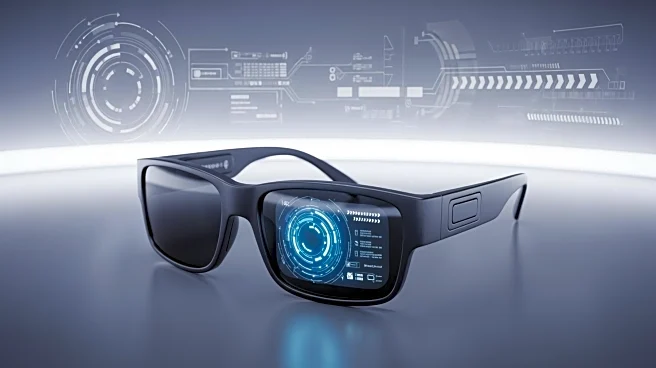What's Happening?
Meta has announced the launch of its first smart glasses with a built-in display, aiming for consumer sales in 2025. This development marks a significant shift in augmented reality (AR) technology, as mainstream glasses are now being priced and packaged
similarly to smartphones. The announcement was made at Meta Connect, where several other AR hardware updates were revealed. IDC projects a 39.2% increase in headset shipments in 2025, indicating a growing retail volume. Samsung is also entering the premium AR market with a device priced at $1,799, challenging consumers' willingness to invest in high-end AR technology.
Why It's Important?
The introduction of smart glasses with built-in displays by Meta represents a pivotal moment in the AR industry, potentially reshaping how consumers interact with technology. This move could lead to increased adoption of AR devices, influencing sectors such as retail, entertainment, and communication. The competitive pricing by Samsung suggests a shift towards more accessible AR technology, which could drive innovation and consumer interest. As AR becomes more integrated into daily life, issues such as privacy and data use will become increasingly important, with regulators focusing on the implications of always-on sensors and cameras.
What's Next?
As AR technology continues to evolve, consumers can expect faster hardware cycles and more applications that address practical tasks. The focus will likely shift towards balancing price and app availability, as companies aim to make AR devices a staple in everyday life. Privacy concerns will remain a critical issue, with ongoing discussions about the regulation of AR behaviors in public spaces. The industry will need to navigate these challenges to ensure the successful integration of AR technology into mainstream consumer markets.
Beyond the Headlines
The development of smart glasses with built-in displays could lead to long-term shifts in how people interact with digital content, potentially influencing cultural and social dynamics. As AR technology becomes more prevalent, ethical considerations regarding surveillance and data privacy will need to be addressed. The integration of AR into various industries could also lead to new business models and opportunities for innovation.

















